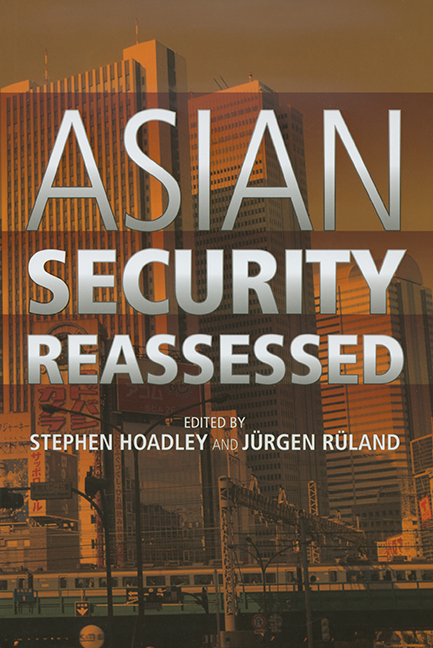Book contents
- Frontmatter
- Contents
- Acknowledgements
- About the Contributors
- List of Abbreviations
- Preface
- Part One Approaches to Asian Security
- Part Two Security Management by Asian States and Regional Institutions
- Part Three Non-Traditional Challenges to Asian Security
- Part Four New Concepts of Asian Security
- 13 Asian Security as a Global Public Good
- 14 Communities and Security in Pacific Asia
- 15 Traditionalism and Change in the Asian Security Discourse
- Index
13 - Asian Security as a Global Public Good
from Part Four - New Concepts of Asian Security
Published online by Cambridge University Press: 21 October 2015
- Frontmatter
- Contents
- Acknowledgements
- About the Contributors
- List of Abbreviations
- Preface
- Part One Approaches to Asian Security
- Part Two Security Management by Asian States and Regional Institutions
- Part Three Non-Traditional Challenges to Asian Security
- Part Four New Concepts of Asian Security
- 13 Asian Security as a Global Public Good
- 14 Communities and Security in Pacific Asia
- 15 Traditionalism and Change in the Asian Security Discourse
- Index
Summary
INTRODUCTION
Asia is beset by security dilemmas. These dilemmas have their origins in the collective memories of Asian societies, and were sharpened by colonial experience and intensified by interaction patterns of the Cold War period. These pre-colonial, colonial, and post-colonial experiences still influence the perceptions of contemporary actors. Present day security dilemmas appear to be embedded in the driving forces of technological change, globalization and cultural diffusion. Policymakers need conceptual tools to resolve these dilemmas, or at least manage them by bridging the different ways of thinking about them. This chapter is an attempt to construct a conceptual bridge by proposing the idea of global public goods.
To conceptualize security dilemmas in terms of globalization, structural change, or the polarities of realist versus liberal political theory is a start. But more concrete results are needed, for example, good governance, sustainable growth and cultural resilience. Reaching consensus on the best route from diagnosis to reform is, however, more difficult than ever. In the years since the fall of the Berlin Wall, those advocating Kantian agendas for peace have suffered disenchantment, but so too have those proposing new Hobbesian world orders. The expectation of an era of fresh opportunity for international peace and security which characterized the early years of the post-bipolar world definitely has gone. Those in the moderate centre advocate pragmatic means of conflict management, including early attention to potential conflicts, confidence-building measures, negotiated peacemaking, pre-emptive containment of disputes, and the threat or use of military force as a last resort. Others support a benevolent hegemonial strategy to allow free markets, sustainable development, and democracy to flourish. Policies abound but a vision is needed to direct them.
TOWARDS A FRESH DISCOURSE
The time is ripe for a fresh discourse on security frameworks. If new concepts of global growth can be manifested to stabilize and strengthen Asian economies, then new comprehensive concepts may be able to meliorate security dilemmas, too. This search for comprehensive concepts should be motivated not by optimism but rather cool political calculation. I propose the concept of global public goods to interpret the dynamics of international relations, security dilemmas and the opportunities of regions such as Asia.
- Type
- Chapter
- Information
- Asian Security Reassessed , pp. 311 - 324Publisher: ISEAS–Yusof Ishak InstitutePrint publication year: 2006



